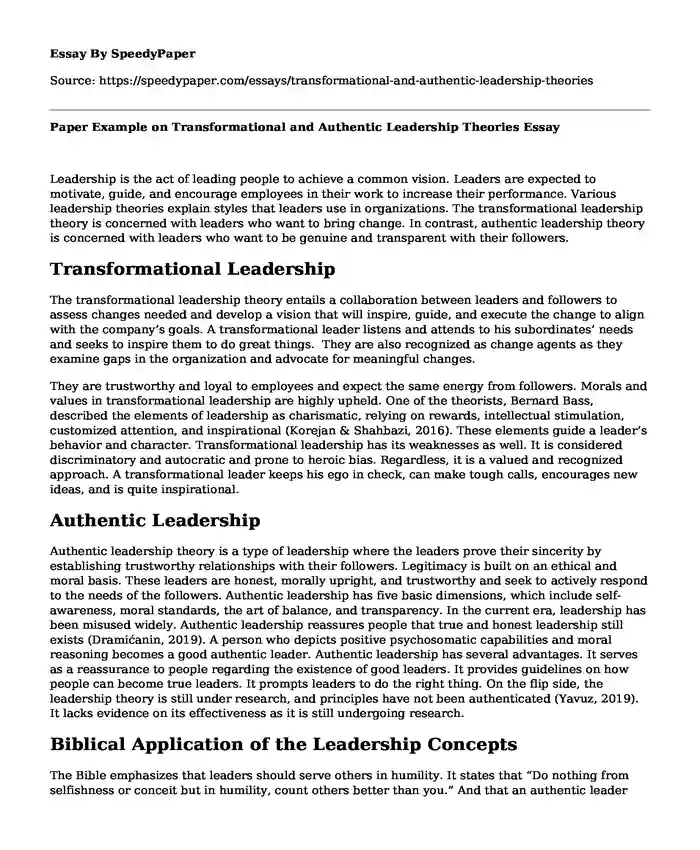
| Type of paper: | Essay |
| Categories: | Motivation Professional development Transformational leadership |
| Pages: | 3 |
| Wordcount: | 731 words |
Leadership is the act of leading people to achieve a common vision. Leaders are expected to motivate, guide, and encourage employees in their work to increase their performance. Various leadership theories explain styles that leaders use in organizations. The transformational leadership theory is concerned with leaders who want to bring change. In contrast, authentic leadership theory is concerned with leaders who want to be genuine and transparent with their followers.
Transformational Leadership
The transformational leadership theory entails a collaboration between leaders and followers to assess changes needed and develop a vision that will inspire, guide, and execute the change to align with the company’s goals. A transformational leader listens and attends to his subordinates’ needs and seeks to inspire them to do great things. They are also recognized as change agents as they examine gaps in the organization and advocate for meaningful changes.
They are trustworthy and loyal to employees and expect the same energy from followers. Morals and values in transformational leadership are highly upheld. One of the theorists, Bernard Bass, described the elements of leadership as charismatic, relying on rewards, intellectual stimulation, customized attention, and inspirational (Korejan & Shahbazi, 2016). These elements guide a leader’s behavior and character. Transformational leadership has its weaknesses as well. It is considered discriminatory and autocratic and prone to heroic bias. Regardless, it is a valued and recognized approach. A transformational leader keeps his ego in check, can make tough calls, encourages new ideas, and is quite inspirational.
Authentic Leadership
Authentic leadership theory is a type of leadership where the leaders prove their sincerity by establishing trustworthy relationships with their followers. Legitimacy is built on an ethical and moral basis. These leaders are honest, morally upright, and trustworthy and seek to actively respond to the needs of the followers. Authentic leadership has five basic dimensions, which include self-awareness, moral standards, the art of balance, and transparency. In the current era, leadership has been misused widely. Authentic leadership reassures people that true and honest leadership still exists (Dramicanin, 2019). A person who depicts positive psychosomatic capabilities and moral reasoning becomes a good authentic leader. Authentic leadership has several advantages. It serves as a reassurance to people regarding the existence of good leaders. It provides guidelines on how people can become true leaders. It prompts leaders to do the right thing. On the flip side, the leadership theory is still under research, and principles have not been authenticated (Yavuz, 2019). It lacks evidence on its effectiveness as it is still undergoing research.
Biblical Application of the Leadership Concepts
The Bible emphasizes that leaders should serve others in humility. It states that “Do nothing from selfishness or conceit but in humility, count others better than you.” And that an authentic leader should be humble and not feel more important than the others.” (Philippians 2: 3-11., RSV). The Bible also states that “You are the light of the world. A city set on a hill cannot be hidden” (Matt 5: 14, RSV). The authentic leader brightens the world by incorporating honesty and transparency. 2 Timothy 2: 2 states that “And what have you heard from me before many witnesses entrust to faithful men who will be able to teach others also.” It recognizes transformational leaders as leaders who will teach others about the gospel. Throughout the gospel books, we see Jesus playing the role of a transformational leader. He invested his time in people. He understood their needs and sought to satisfy them. Also, he motivated them to take up a new life through teachings. For instance, he taught the Lord’s Prayer, which we still use today.
Conclusively, the transformational leaders bring changes to the organization while the authentic leaders employ honesty and transparency in their leading style. The two types of leadership are beneficial in our organizations. Managers should use both techniques to create the right working environment and establish strong relationships with their employees, which will improve their performance (Yavuz, 2019).
References
Dramicanin, S. (2019). The impact of authentic leadership on the commitment of employees in travel agencies in the Republic of Serbia. Bizinfo Blace. 10. 29-41. 10.5937/bizinfo1901029D.
Korejan, M & Shahbazi, H. (2016). An analysis of the transformational leadership theory. Journal of Fundamental and Applied Sciences. 8. 452. 10.4314/jfas.v8i3s.192.
Yavuz, M. (2019). Transformational Leadership and Authentic Leadership as Practical Implications of Positive Organizational Psychology. 10.4018/978-1-7998-0058-3.ch008.
Cite this page
Paper Example on Transformational and Authentic Leadership Theories. (2023, Dec 14). Retrieved from https://speedypaper.net/essays/transformational-and-authentic-leadership-theories
Request Removal
If you are the original author of this essay and no longer wish to have it published on the SpeedyPaper website, please click below to request its removal:
- Free Essay on Importance and Styles of Leadership
- Free Essay: The Prospective Morning Meditation
- Essay Sample on Starbucks' Organizational Setting
- Essay Example: Curriculum Mapping, Quality, and Safety Education for Nursing
- Paper Example: Nike Brand Analysis
- Summary of the Initiative. Free Essay
- Essay Sample on Career Interview: Daniel Fernandez
Popular categories




